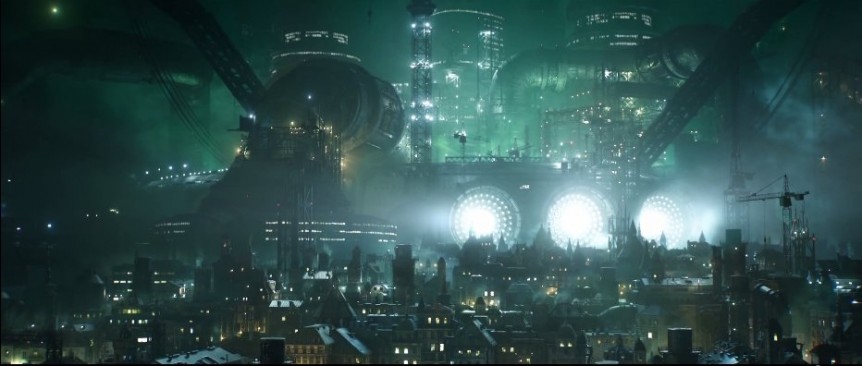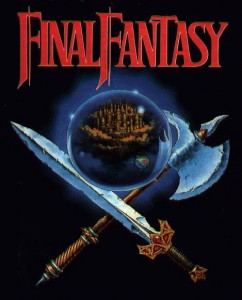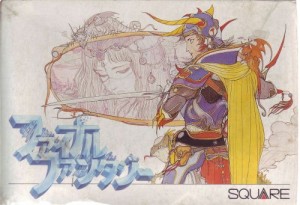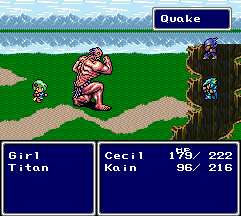Not every post on this blog needs to be about Fantasy Infinity.
Last week’s big Final Fantasy news got me thinking about my relationship to the series over the years. So this seems like a good time for a bit more of a personal entry. This is part one of what will probably be a three part series (plus or minus 1) about my personal history with the Final Fantasy games. This is primarily autobiography for its own sake and for the sake of making this blog feel a bit more personal. I will occasionally mention Fantasy Infinity, mostly in terms of what elements were borrowed from or inspired by other games, but only because that topic is inextricably linked to the role the FF games have played in my life.
For a lot of people, Final Fantasy VII was an important, formative experience. I am not one of them. I’m sort of a Final Fantasy hipster – I was into it before it was cool. And it was FF7 that made it cool.
I first heard the name Final Fantasy in high school, when my then-girlfriend excitedly informed me that a game of that name was coming out in North America, a piece of information no doubt gleaned from her younger brother’s latest issue of Nintendo Power. I had no idea what she was talking about. Knowing me at the time, I probably said so in some conspicuously undiplomatic manner. But thinking about it later, she knew my taste in games rather well, plus if she was this stoked about it, that alone made it like 70-30 that I’d like it too. So I remembered to look for it, at least.
And when I eventually saw it, it had a cool box cover. That was really important in those days. Had they used the original Japanese cover for that particular release, I might never have gotten interested in the series.
So I made sure to rent it when it came out. This was the English-language release of the original Final Fantasy, for the NES.
Honestly, it wasn’t anything that amazing. It was pretty much of a piece with other RPGs of its time, with maybe a bit of a slicker interface (clumsy though it seems today). There was very little, in particular, to indicate something that would become very obvious with later Final Fantasy games, that this was a Japanese game. I do recall feeling like there was something a bit “off” about the line “I, Garland, will knock you all down!”. But on the whole, if anything, it wore its Dungeons & Dragons influences more openly than, say, Ultima IV. I enjoyed it and played it to completion, but it was in no way a life-changing experience. If I were to review it today, I suspect I would start out by saying it was pretty good, but would so visibly struggle to find positive things to say about it that you’d wonder if I really meant it.
By way of analogy: There’s a progressive rock band called Arena that I like a lot. But sometimes I used to ask myself why. “Honestly, their music is pretty much just an amalgamation of every prog-rock cliche in the book,” I would tell myself. And it was true. Eventually I admitted that my question contained its answer. I liked them because I liked those cliches.
Well, that’s how I was with computer RPGs back then. Sometimes still am. It’s probably the only reason I stuck it out with the original Final Fantasy.
In spite of all this, at some point I acquired the cartridge. I have no memory of when or how this happened, but it must have, because I just checked and it’s still there. Box, instructions, maps, and all, in nearly perfect condition. Indeed, the one thing marring it is a price tag that says I paid $14.95 for it. Even translating from 1989-ish dollars, that’s not much for a hit videogame, so I almost certainly bought it used, probably motivated chiefly by the fact that it’s too long to really do justice to as a rental. That would probably have seemed worthwhile to me for a good-but-not-great, somewhat derivative RPG.
So when I heard from my cousin that there was a Final Fantasy II, I was only mildly interested.
Until I actually played it.
Now, I pause to note that memory seems to have betrayed me. I could have sworn I was still in high school at the time of my first exposure to Final Fantasy II (as its initial English-language release on the SNES was called), but both Wikipedia and the Final Fantasy wikia disagree. Apparently the North American release didn’t happen until late November, 1991. Even granting that I was playing my cousin’s rented copy within minutes of hearing about it, that makes November 1991 the earliest that incident could possibly have taken place – which puts me a decent ways into the first year of my first run at university. This might be worth keeping in mind vis a vis the reliability of the narrator in this series.
One thing is certain, though: this was a game-changer. (No pun intended.) The SNES Final Fantasy II – now better-known by its original Japanese numbering, as Final Fantasy IV – did so many things I hadn’t previously realized it was possible for a videogame to do that it not only transformed the way I looked at videogames, but at entertainment generally.
So many things impressed me about this game:
- The soundtrack, for one thing. While some other bits of videogame music I must have heard earlier – most obviously some from the Super Mario Bros. series – have nostalgia value for me, this was the first time a videogame soundtrack had actually struck me as good, even shorn of its context. The orchestrations that have come out since bear this out. Little did I know Nobuo Uematsu’s best work still lay ahead of him.
- Speaking of Uematsu, this was probably the first time I thought of a videogame as a creative act by specific individuals. Most earlier games, with their lack of credits, gave the impression that these things sprang fully formed from the head of Jupiter. I mean, if you’d actually asked me how I thought they came to be, that’s not the story I would have told you. But that’s just it – it hadn’t previously occurred to me to ask that question, even of myself.
- The standard of storytelling. While it’s been equalled and even (on rare occasions) surpassed since, this was easily the most sophisticated story I’d seen in a videogame at the time. Even other RPGs rarely had a plot twist more sophisticated than “the guy you thought was the main villain is only a puppet of an even worse villain” (thus indicating that there was more gameplay left, but also that it would be pretty much of a piece with what had gone before). Non-RPG videogames seldom got beyond the level of “Sorry, your princess is in another castle” (which had much the same meaning). But here, for the first time I know of, was a story as complex as any it was possible to create in a tabletop RPG like Dungeons & Dragons. The only thing missing – and it’s an important piece which I immediately started thinking about how you’d implement – was meaningful player choice.
- The sheer imagination. Of course you should be able to fly to the moon in an ancient whale-shaped submarine. Why would anyone ever not do that?
It was also probably the most mechanically elegant electronic RPG I’d seen up to that point, and I immediately started thinking about how to implement some of its ideas in a tabletop game. The biggest was probably turn-based combat that didn’t have rounds, such that faster characters, or at any rate characters taking faster actions, actually got turns more frequently, not just earlier in the combat round. I have been, off and on, trying to work out a way to implement this in a tabletop RPG ever since, with Fantasy Infinity‘s initiative track being my latest try at this and the first I’ve been happy with. The elegant selection of spells, mechanically supported options for fighters other than just hitting things, and the way simple elements combined to give combat at least some tactical sophistication are all things I first noticed in Final Fantasy IV, have been thinking about how to do at the tabletop ever since, and have finally implemented in ways I’m happy with in Fantasy Infinity.
Game mechanics nerdery aside, though, the story bears further comment. Not all of it came through because the translation was… well, the most positive thing that can be said is that at least it wasn’t Zero Wing. (Actually, that’s the second most positive thing, after “It gave the world one of the great stupid lines of all time, namely ‘You spoony bard!'”) But enough did to make it clear that it was about a flawed hero atoning for his past misdeeds. It had a moral dimension that really resonated with me.
It was different.
It wouldn’t have occurred to me to articulate it this way at the time, but it wasn’t another damn Hero’s Journey, though it did have some elements of that. It wasn’t just a much stronger story than I was used to seeing in a videogame, it was a subtly different story than I was used to seeing come out of my culture, period.
I had heard of Joseph Campbell at the time and – and this is probably the most shameful admission I will make in this series – did not, at this point, think he was a complete shithead. I mean, he was the first adult intellectual I knew of to take Star Wars seriously. At a time when “nerd” was a much stronger pejorative than it is now, that bit of validation counted for a lot. I was, and in some ways still am, only beginning to develop the tools to really think critically about someone like him.
This is where I go “damn it, Jim, I’m a philosopher, not a literary critic” because I feel very limited in the vocabulary I have to describe this. I would have been even more tongue-tied if put on the spot about it at the time. All I knew was that I was hooked, and couldn’t wait to see what this “SquareSoft” bunch would come up with next.
to be continued…
NB All images in this post are the intellectual property of Square-Enix. No challenge to that status is intended by my use of them, which in any case, I believe is most likely a net benefit to the legitimate IP holder. To put it a slightly different way, please don’t sue me. If you represent Square-Enix or an affiliated company and have any issues with the images in this post, feel free to contact me and I will be happy to discuss them.




Comments 3
I only played FFII recently, and it definitely has more depth than many newer games.
I admit to being one of the FF fans who started with FFVII, so I’m not hip, lol. But it did spark my love for, not just RPGs, but video games as a whole. If you’re going to be influenced by something, FF is an excellent choice!
Final Fantasy II (IV) remains my absolute favorite in the entire series.
I love the big things – the moment when a certain character changes his class; the sense of soaring freedom when you first take off in an airship and the flying music kicks in; the emotional ups and downs, the love and the losses and the returns and the moon continues on its journey and the crystals silently shed their light and I cry at the ending every single time.
I also love the trivial things, like being able to rename the characters and imagine the conversations they have on the road to the village of Mist.
Author
If imagining the conversations they’re having on the road interests you that much, I suspect you’ll really appreciate Fantasy Infinity.